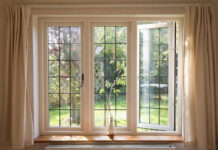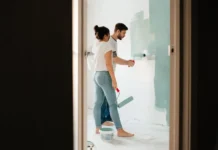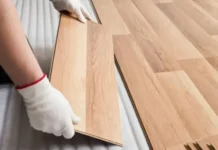Wondering how to cool down your room this summer? Here’s a list of 15 amazing ways you can Summer-proof your home and beat the heat!
The summer is a perfect time to spend your day relaxing, enjoying the longer daylight hours, and maybe taking naps near the pool. The summer can also become unbearably hot.
You can mitigate discomfort by knowing how to cool down your room.
These 15 tips will help cool your home, cut down on energy bills, and enjoy the summer with absolute ease.
1. Close the Curtains
Natural sunlight is great for any room, but the temperatures will rise and force your air conditioning to work harder. If you’re not using a room for extended periods, consider keeping the curtains closed.
Make the curtains more effective by getting blackout curtains to repel all the heat.
Install semi-sheer curtains so you can still block some of the heat but also allow the beautiful natural light to come through.
2. Insulation
Insulation isn’t just an excellent way to keep warm air inside during the winter. Adding insulation will also keep the cool air trapped.
A home without proper insulation is like trying to use your air conditioner to cool the outdoors – it just won’t work.
The summer months are the best time to add insulation to walls, floors, or ceilings. It’s more pleasant to try and complete construction projects while it’s sunny instead of snowing.
3. Your Meals Matter
Whether you’re preparing a delicious meal or order takeout, consider the effect hot food has on your body. A warm oven or stove will raise the temperature of your house as well as your body.
Grill outside or over a fire pit so the heat isn’t forming in the house. If you want to avoid the heat altogether, eat a salad or fruit-based meal to avoid getting too hot.
The beverages you choose with your meal also make a difference. Pick a cold glass of water or juice with your food. If you absolutely need coffee in the morning, make the switch to iced coffee.
4. Turn Off the Lights
Even the most energy-efficient light bulbs still give off heat and energy. If you need light during the day, pull back the curtains, or use semi-sheer fabrics on the window.
If you have old incandescent lights, change to a lower wattage to avoid the high electric bills and heat.
Turning off lights can save you money, energy, and prevent the house from getting too warm. With longer daylight hours in the summer, try and hold off using lights until well into the evening.
5. Prepare Sleeping Quarters Downstairs
Since heat rises, a room upstairs might get too hot during the summer months. Stay cool by sleeping in a room closer to the ground.
If you have the option, basements are the best places to get a cool night’s sleep especially if you are a warm body.
For people who live in apartments, if you are on a high floor, try putting your mattress and bedding on the floor to avoid the full effect of heat.
6. Change Your Sheets
What kind of sheets and bedding do you use during the winter? The fabric and thickness are engineered towards staying warm during the cold. It’s probably time to change your sheets for the summer.
Look for cotton sheets that allow your body to breathe. There are also pillows that have cooling technology available.
7. Make Personal Choices
Most people probably aren’t getting enough water throughout the day. Drinking water helps us regulate our body temperatures and hydrate.
Drink more water during the day and you will see your body adjust to the heat much better. Try avoiding soda or warm beverages that may have negative results on your health.
Your personal choices in wardrobe can also make the day cooler.
Ditch the pants and layers for more comfortable clothing. Loose fit clothes work great in dry heat. Dresses and shorts are great for people who are just trying to stay cool and avoid clothes that are made in dark colors or heavy fabrics.
If the heat is unbearable at night, let your partner or spouse know that you need to sleep in a separate bed or area to keep cool. Cuddling and body heat can be contributing factors to getting warm.
8. Check the Air Conditioning Unit
Whether you have a window unit or central heating and cooling, once a year you should have a maintenance appointment. Let a trained technician service your unit to make sure it’s working effectively and efficiently.
Your air conditioner could have a leak or damaged component that is keeping it from cooling your room. Problems with the unit could also cause it to work harder unnecessarily thus driving up utility bills.
Something as simple as changing an air filter in an air conditioning unit can make all the difference.
9. Conduct an Audit
Do you know all the spots in your home that need air the most? You might have gaps or holes that are allowing hot air into the house. You could also have rooms that don’t need as much cooling.
For example, focus your cooling efforts on a room that isn’t protected by the shade of a tree.
Make sure all appliances and electronics are turned off or running at an optimal setting. By reducing energy, you can divert those resources to running your cooling without a high energy bill.
Call a professional if you discover warm air coming in where two separate building materials combine.
10. How to Cool Down Your Room With a Breeze
Temperatures typically drop at night. Open up your windows and turn on a craftmade ceiling fan to create the perfect cooling breeze.
You don’t need to turn on your central air to stay cool at night. Save yourself the money by using nature to help you get to sleep at night. Just remember to close your windows in the morning and turn off your fans.
Using fans without air conditioning or cool temperatures tends to move the heat around instead of making rooms more comfortable.
11. Upgrade Windows and Doors
As entry points to your home, windows and doors are the most vulnerable spots for summer-proofing. The older the windows and doors, the less effective they will be in the summer or winter.
Windows can reflect and absorb incredible amounts of energy. Older windows will allow any wavelengths to pass through, while newer windows can have film technology to protect from harmful rays.
Older windows will also allow the heat to come into the house and make your air conditioner work overtime.
The doors in your home also matter. Like house windows, doors should completely shut and not allow a large amount of heat to enter. Older glass doors or storm doors might heat up the solid exterior door and make the entry warm.
When you check your windows and doors, ask about energy-efficient options that have the technology to reduce unwanted heat entry.
12. Spend Time Outside
You can make the house more energy efficient by going outside. The more time you enjoy leisure activities, the less you need to have the air conditioner or fans running.
Spend a few hours hiking on the weekend, and your home will feel a lot cooler to you than if you just sat around all day.
Take a trip to a local lake or swimming pool, and don’t return until dark. Your home will be just as cool as when you left it.
13. Program the Thermostat
Programming the thermostat is a great way to save money and know your limits. Do you know the warmest or coldest temperatures you can tolerate?
Set the cold air to come on when it hits a temperature you find to be unbearable, but don’t forget to have the cool air switch off automatically when it reaches a temperature people might think is too cold.
If you have multiple window units, you can change the settings to match the preferences and uses of each room. There’s a good chance you’ll have separate settings throughout the house.
14. Provide Shade
Create shade for the house to keep the temperatures down. You can accomplish this by planting trees in strategic places or installing overhangs and awnings on windows that receive direct sunlight.
While you wait for trees to grow, you might have to segment parts of the home to stay cool. If there are rooms you don’t really use during the day, make sure those doors and vents are closed.
This allows the cool air in the house to focus on problem areas.
15. Hot Showers
Don’t take long hot showers in the morning anymore. You still need to use warm water to help kill the germs but consider taking a slightly shorter and cooler shower.
You can also switch up the times you shower or bathe by waiting until it’s dark and cooler outside. A shorter and cooler shower will lower your home’s utilities, too.
Be Cool This Summer
Knowing how to cool down your room, home, and body will be key to enjoying your summer. If you follow these tips, you’ll save energy, money, and survive hot temperatures.
If you’re interested in learning more helpful articles, keep reading our blog.



































































